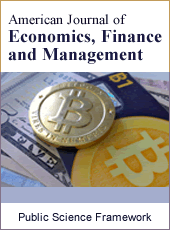American Journal of Economics, Finance and Management
Articles Information
American Journal of Economics, Finance and Management, Vol.1, No.5, Oct. 2015, Pub. Date: Aug. 23, 2015
Tourism Developments and Its Effects on Economic Growth in Selected Countries
Pages: 554-558 Views: 5669 Downloads: 1350
[01]
Fateh Habibi, Department Economics, Faulty of Humanities and Social Sciences, University of Kurdistan, Sanandaj, Iran.
This study investigates a long-run relationship and the Granger-causality among tourism development (TD) and economic growth in sample of 85 countries classified in four groups namely Europe, Africa, Asia and American countries for annual data from 2000 to 2013. The results demonstrate that tourism development and economic growth are cointegrated; on the other hand, a long run relationship can be inferred among these two variables in four groups. The results of panel Granger Causality test show the existence of bi-directional and unidirectional causality between tourism development and economic growth in Europe and Asia countries respectively. Also, there is no causal relationship between variables in Africa countries.
Tourism Development, Economic Growth, Panel Causality
[01]
Balaguer J, Jorda M.C. 2002. Tourism as a long-run economic growth factor: the Spanish Case. Applied Economics, 34: 877–84.
[02]
Chen C.F, Wei S.Z. 2009. Tourism expansion, tourism uncertainty and economic growth: new evidence from Taiwan and Korea. Tourism Management, 30: 812–818.
[03]
Chou C.M. 2013. Does tourism development promote economic growth in transition countries? A panel data analysis. Economic Modeling 33: 226-232.
[04]
Dritsakis N. 2004. Tourism as a long-run economic growth factor: An empirical investigation for Greece using a causality analysis. Tourism Economics, 10(3): 305–316.
[05]
Durbarry R. 2004. Tourism and economic growth: The case of Mauritius. Tourism Economics, 10(4): 389–401.
[06]
Engle, R.F.; Granger, C.W.J. (1987), Co-Integration and Error Correction: Representation Estimation, and Testing, Econometrica, Vol. 55, No. 2, pp. 251-276.
[07]
Gunduz L, Hatemi-J A. (2005). Is the tourism-led growth hypothesis valid for Turkey? Applied Economics Letters, 12(8), 499–504.Holzar M. (2010). Tourism and development: the beach disease. Tourism Management, 32, 922–933.
[08]
Jalil A, Muhammad T, Idrees, M. 2013.Tourism–growth nexus in Pakistan: Evidence from ARDL bounds tests. Economic Modeling, 35: 185-191.
[09]
Im, K.S.; Pesaran, M.H.; Shin, Y. (2003), Testing for unit roots in heterogeneous panels, Journal of Econometrics, Vol. 115, No. 1, pp. 53-74.
[10]
Katircioglu S. (2009). Tourism, trade, and growth: the case of Cyprus. Applied Economics, 41, 2741–2751.
[11]
Kim H.J, Chen M.H and Jang S.S. 2006. Tourism expansion and economic development: the case of Taiwan. Tourism Management, 27(5): 925–933.
[12]
Krueger A.O.1980. Trade policy as an input to development. American Economic Review, 70: 288–292.
[13]
Lee CC, Chang C. (2008). Tourism development and economic growth: a closer look at panels. Tourism Management, 29, 180–192.
[14]
Lee W.J and Brahmasrene 2013. Investigating the influence of tourism on economic growth and carbon emissions: Evidence from panel analysis of the European Union, Tourism management, 38: 69-76.
[15]
Oh CO. (2005). The contribution of tourism development to economic growth in the Korean economy. Tourism Management, 26(1), 39–44.
[16]
Pedroni, P. (1999), Critical Values for Cointegration Tests in Heterogeneous Panels with Multiple Regressors, Oxford Bulletin of Economics and Statistics, Vol. 61, No. 0, pp. 653-70.
[17]
Tang C.F. 2011. Is the tourism-led growth hypothesis valid for Malaysia? A view from disaggregated tourism markets. International Journal of Tourism Research, 13: 97–101.
[18]
Tang, S., Selvanathan, E.A. and Selvanathan, S. 2007. The Relationship between Foreign Direct Investment and Tourism: Empirical Evidence from China. Tourism Economics, 13(1): 25-39.
[19]
WTTC. http://www.wttc.org/, 2014.

ISSN Print: 2381-6864
ISSN Online: 2381-6902
Current Issue:
Vol. 5, Issue 3, September Submit a Manuscript Join Editorial Board Join Reviewer Team
ISSN Online: 2381-6902
Current Issue:
Vol. 5, Issue 3, September Submit a Manuscript Join Editorial Board Join Reviewer Team
| About This Journal |
| All Issues |
| Open Access |
| Indexing |
| Payment Information |
| Author Guidelines |
| Review Process |
| Publication Ethics |
| Editorial Board |
| Peer Reviewers |


